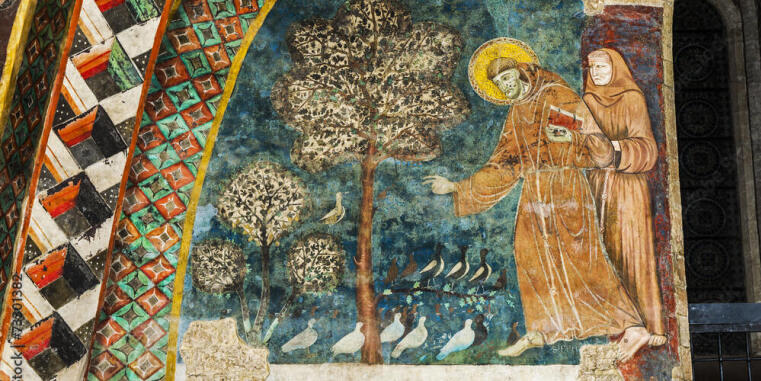

The DFG network TTIR (TierTheologie InterReligiös, Animal Theology InterReligious) is dedicated to the question of how the monotheistic religions of Judaism, Christianity and Islam can contribute to changing the relationship between humans and animals. In light of ecological crises, species extinction and growing sensitivity to the way humans treat animals, we are seeking answers to the question of what role religions can play in transforming the relationship between humans and animals.
The network builds on the increasing engagement with this question in Jewish, Christian and Islamic theologies and aims to deepen the discussion from an interreligious perspective and with a focus on the relationship between God, humans and animals. Our approach is therefore interreligious and interdisciplinary: we want to analyse the theological traditions of God-human-animal relationships in their differences and similarities and develop a common, interreligiously viable animal theological perspective.
Our goal is to contribute to the profiling of animal ethical and animal theological positions within the various theologies and to show that theologies can also make an important contribution to the non-theological discourse of animal ethics and human-animal studies. In addition, we also want to strengthen interreligious scientific exchange and interreligious language skills through our approach.
At the end of the project, the results of the network will be recorded in a publication in the form of an interreligious handbook on animal theology and made available to academic and public discourse.
Members
- Yael Attia, MA, Research Assistant, Centre for Comparative Theology and Cultural Studies, University of Paderborn
- Jun.-Prof. Dr. Asmaa El Maaroufi, Chair of Islamic Philosophy and Ethics, Centre for Islamic Theology, University of Münster
- Prof. Dr Julia Enxing, Chair of Fundamental Theology, Faculty of Catholic Theology, Ruhr University Bochum
- Prof. Dr Anne Käfer, Chair of Systematic Theology, Faculty of Protestant Theology, University of Münster
- Prof. Dr Andreas Krebs, Chair of Old Catholic and Ecumenical Theology, Old Catholic Seminary, University of Bonn
- Dr Cornelia Mügge, Research Assistant, Institute for Ethics and Related Social Sciences, Faculty of Protestant Theology, University of Münster
- Philipp Räubig, M.A., Research Assistant at the Chair of Fundamental Theology, Faculty of Catholic Theology, Ruhr University Bochum
- Prof. em. Dr. Thomas Ruster, Chair of Catholic Theology with a focus on Systematic Theology/Dogmatics, Institute for Catholic Theology, University of Dortmund
- Dr. Saida Mirsadri, Research Assistant, Chair of Islamic Systematic Theology, Institute for Islamic Theology, University of Paderborn
- Yasemin Amber, M.A., Research Assistant at the Chair of Islamic Philosophy and Ethics, Centre for Islamic Theology, University of Münster
- Prof. Dr Jonathan Schorsch, Chair of Jewish Religious and Intellectual History, School of Jewish Theology, University of Potsdam
- PD Dr Gregor Taxacher, Research Assistant, Systematic Theology/Dogmatics, Institute for Catholic Theology, Technical University of Dortmund
Current News from the project
Conference report on the first network meeting:
The DFG network ‘Connected in God. Transformations of the Human-Animal Relationship from an Interreligious Perspective’ has successfully held its first conference. From 28 to 30 October 2025, scholars of Jewish, Christian and Islamic theology from all over Germany met in Münster to discuss the topic of ‘(Inter-)Relationality as a fundamental category in the relationship between God, humans and animals’.The network, led by Asmaa El Maaroufi and Cornelia Mügge, has set itself the goal of researching the contribution of religions to transformations in the human-animal relationship. The first conference focused on the analysis of theological concepts of relationship and relationality – with regard to God, humans and animals. Inspiring presentations, such as those on the relationality of animals from an Islamic theological perspective, on family relationships among animals in the Jewish tradition, and on Christian anthropocentrism, provided important impetus for joint research. Lively discussions and intensive exchanges among the participants allowed for a deeper exploration of the topics and laid important foundations for future collaboration.
A highlight of the conference was the public kick-off event with a guest lecture by Ahmad Milad Karimi on the relationality of God and a panel discussion on its relevance to animal theology with members of the network.
The successful launch of the network promises further fruitful and productive cooperation. Through close interreligious cooperation between scholars of different theologies, the network will make an important contribution – both to research on human-animal relations in religions and to the creation of a sustainable and just society.
Opening event:
On 29 October 2025, the DFG network ‘Connected in God: Transformations of the Human-Animal Relationship from an Interreligious Perspective’ invites you to a public opening event to mark the start of its work. The event will begin at 6:15 p.m. at the Alexander von Humboldt House (Hüfferstr. 61, 48149 Münster).The network will introduce itself at the kick-off event and is pleased to welcome Prof. Milad Karimi as a guest speaker for a keynote address on ‘The Relationality of God from an Islamic-Theological Perspective’. The lecture and a panel discussion with members of the network will be followed by a reception.
Registration is requested.
You can find all the important information here in the flyer...
Workshop Meeting:
From 28–30 October 2025, the first working meeting of the DFG Network “United in God. Transformations of the Human–Animal Relationship in Interreligious Perspective” will take place at Haus Mariengrund in Münster. Under the theme “(Inter-)Relationality as a Fundamental Category in the Relationship between God, Humans, and Animals”, the meeting explores theological and interdisciplinary perspectives on relationality in creation.Further details can be found in the flyer...
